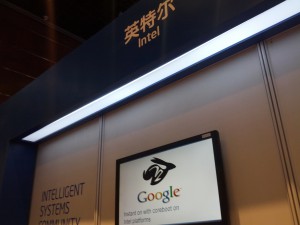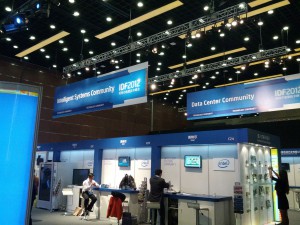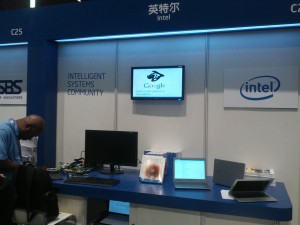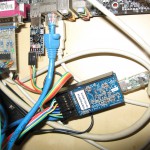I'm happy to finally announce an open-source (GNU GPL), cross-platform (Linux, Mac OS X, FreeBSD, Windows, ...) logic analyzer software package myself and Bert Vermeulen have been working on for quite a long time now: sigrok (it groks your signals).
History
I originally started working on an open-source logic analyzer software named "flosslogic" in 2010, because I grew tired of almost all devices having a proprietary and Windows-only software, often with limited features, limited input/output file formats, limited usability, limited protocol decoder support, and so on. Thus, the goal was to write a portable, GPL'd, software that can talk to many different logic analyzers via modules/plugins, supports many input/output formats, and many different protocol decoders.
The advantage being, that every time we add a new driver for another logic analyzer it automatically supports all the input/output formats we already have, you can use all the protocol decoders we already wrote, etc. It also works the other way around: If someone writes a new protocol decoder or file format driver, it can automatically be used with any of the supported logic analyzers out of the box.
Turns out Bert Vermeulen had been working on a similar software for a while too (due to exactly the same reasons, crappy Windows software, etc.) so it was only logical that we joined forces and worked on this together. We kept Bert's name for the software package ("sigrok"), set up a SourceForge project, mailing lists, IRC channel, wiki, etc. and started working.
Overview, Features
You can get the lastest sigrok source code from our main git repository:
$ git clone git://sigrok.git.sourceforge.net/gitroot/sigrok/sigrok
Here's a short overview of sigrok and its features as of today. The software consists of the following components:
-
libsigrok, a shared library written in C, which contains the general infrastructure for handling logic analyzer data in a streaming fashion.

It also contains the individual hardware drivers which add support for various logic analyzers. Currently supported hardware includes: Saleae Logic, CWAV USBee SX, Openbench Logic Sniffer (OLS), ZEROPLUS Logic Cube LAP-C, ASIX Sigma/Sigma2, ChronoVu LA8, and others. Many more devices are on our TODO list (and we already own them), it's just a matter of time to reverse engineer the USB protocols and implement a driver for them.Thanks ASIX for being open and helping with the ASIX Sigma driver, and many thanks to ChronoVu for being open as well and providing information about the ChronoVu LA8 protocol! Thanks to Håvard Espeland, Martin Stensgård, and Carl Henrik Lunde (who contributed the ASIX Sigma driver), Sven Peter and "Haxx Enterprises"/bushing (for contributing the ZEROPLUS Logic Cube LAP-C driver, ported from their zerominus tool). Also, thanks to Daniel Ribeiro and Renato Caldas who worked on the Link Instruments MSO-19 driver (still work in progress).
Finally, libsigrok also contains the individual input/output file format drivers. Currently supported are: sigrok session (the default format, which contains all metadata), bits, hex, ASCII, binary, gnuplot, the OpenBench Logic Sniffer format, the ChronoVu LA8 format, Value Change Dump (VCD) viewable in gtkwave, and Comma-separated values (CSV).

-
libsigrokdecode, a shared library written in C, which contains the protocol decoder infrastructure and the protocol decoders themselves, which are written in Python (>= 3.0).
The list of currently supported protocol decoders includes:
dcf77 DCF77 time protocol lpc Low-Pin-Count mx25lxx05d Macronix MX25Lxx05D jtag_stm32 Joint Test Action Group / ST STM32 i2s Integrated Interchip Sound spi Serial Peripheral Interface edid Extended display identification data pan1321 Panasonic PAN1321 mlx90614 Melexis MLX90614 jtag Joint Test Action Group rtc8564 Epson RTC-8564 JE/NB transitioncounter Pin transition counter usb Universal Serial Bus i2cdemux I2C demultiplexer i2c Inter-Integrated Circuit i2cfilter I2C filter mxc6225xu MEMSIC MXC6225XU uart Universal Asynchronous Receiver/Transmitter
Many more decoders are on our TODO list, and we especially welcome contributed protocol decoders, of course! We intentionally chose Python as implementation language for the decoders, to make them as easy to write (and understand) as possible, even if that means that performance suffers a bit. Have a look at the SPI decoder for example, to get a feeling for the implementation.
Protocol decoders can be stacked on top of each other, e.g. you can run the i2c decoder and pipe its output into the rtc8564 (Epson RTC-8564 JE/NB) decoder for further processing of the RTC-specific, higher-level protocol. We also plan to support more complex stacking and combining of decoders in various ways in the nearer future.
-
sigrok-cli, is a command-line frontend, which uses both libsigrok and libsigrokdecode. It can acquire samples from logic analyzers and output them in various formats into files or to stdout, and/or run protocol decoders on the aquired data.
Example: Data acquisition with 1MHz samplerate into a file.
$ sigrok-cli -d chronovu-la8:samplerate=1mhz --time 1ms -o test.sr
Example: Protocol decoding (JTAG).
$ sigrok-cli -i test.sr -a jtag:tdi=5:tms=2:tck=3:tdo=7 [...] jtag: "New state: EXIT1-IR" jtag: "IR TDI: 11111110, 8 bits" jtag: "IR TDO: 11110001, 8 bits" jtag: "New state: UPDATE-IR" jtag: "New state: RUN-TEST/IDLE" [...]
-
sigrok-qt, a Qt-based GUI for sigrok, using both libsigrok and libsigrokdecode.
This is intended to be a cross-platform GUI (runs fine and looks "native" on Linux, Windows, Mac OS X) supporting data acquisition and protocol decoding.
NOTE: The Qt GUI is not yet usable! We're working on getting it out of alpha-stage for the next release.
-
sigrok-gtk, a GTK+-based GUI for sigrok, using both libsigrok and libsigrokdecode (soon).

This is a cross-platform GUI contributed by Gareth McMullin (thanks!), supporting data aqcuisition (and soon protocol decoding).NOTE: The GTK+ GUI is not yet fully usable (but it's more usable than sigrok-qt)! Consider it alpha-stage software for now.
We're happy to hear about other (maybe special-purpose) frontends you may want to write using libsigrok/libsigrokdecode as helper libs!
Firmware
Some logic analyzer devices require firmware to be uploaded before they can be used. As always, firmware is a bit of a pain, but here's what we currently do: For non-free firmware we provide instructions how to extract it from the vendor software or from USB dumps, if possible. For distributable firmware we have a git repo where you can get it (thanks ASIX for allowing us to distribute the ASIX Sigma/Sigma2 firmware files!).
$ git clone git://sigrok.git.sourceforge.net/gitroot/sigrok/sigrok-firmwares
Finally, for all Cypress FX2 based logic analyzers we have an open-source (GNU GPL) firmware named fx2lafw, started by myself, but most work (and finishing the firmware) was then done by Joel Holdsworth, thanks! The support list includes Saleae Logic, CWAV USBee SX, CWAV USBee AX, Robomotic Minilogic/BugLogic3, Braintechnology USB-LPS, and many others. Get the code from the fw2lafw git repository:
$ git clone git://sigrok.git.sourceforge.net/gitroot/sigrok/fx2lafw
Example dumps
We collect various captured logic analyzer signals / protocol dumps in the sigrok-dumps git repository:
$ git clone git://sigrok.git.sourceforge.net/gitroot/sigrok/sigrok-dumps
They can be useful for testing the sigrok command-line application, the sigrok GUIs, or the protocol decoders.
We're happy to include further contributed example data in our repository, please send us .sr files of any interesting data/protocol you may come across (even if sigrok doesn't yet have a protocol decoder for that protocol). See the Example dumps wiki page for details.
Packages, distros, installers
I'm currently working on updated Debian packages for sigrok (will be apt-get install sigrok to get everything), and we're happy about further packaging efforts for other distros. We have preliminary Windows installer files (using NSIS), but the Windows code needs some more fixes and portability improvements before it's really usable. On Mac OS X you can use fink/Macports to install as usual, fancier .app installer files are being worked on.
Future
Apart from support for more logic analyzers, input/output formats, and protocol decoders, we have a number of other plans for the next few releases. This includes support for analog data, i.e. support for (USB) oscilloscopes, multimeters, spectrum analyzers, and such stuff. This will also require additional GUI support (which could take a while). Also, we want to improve/fix the Windows support, and test/port sigrok to other architectures we come across. Performance improvements for the protocol decoding as well as more features there are also planned.
Contact
Feel free to contact us on the sigrok-devel mailing list, or in the IRC channel #sigrok on Freenode. There's also an identi.ca group for sigrok. We're always happy about feedback, bug reports, suggestions for improving sigrok, and patches of course!









